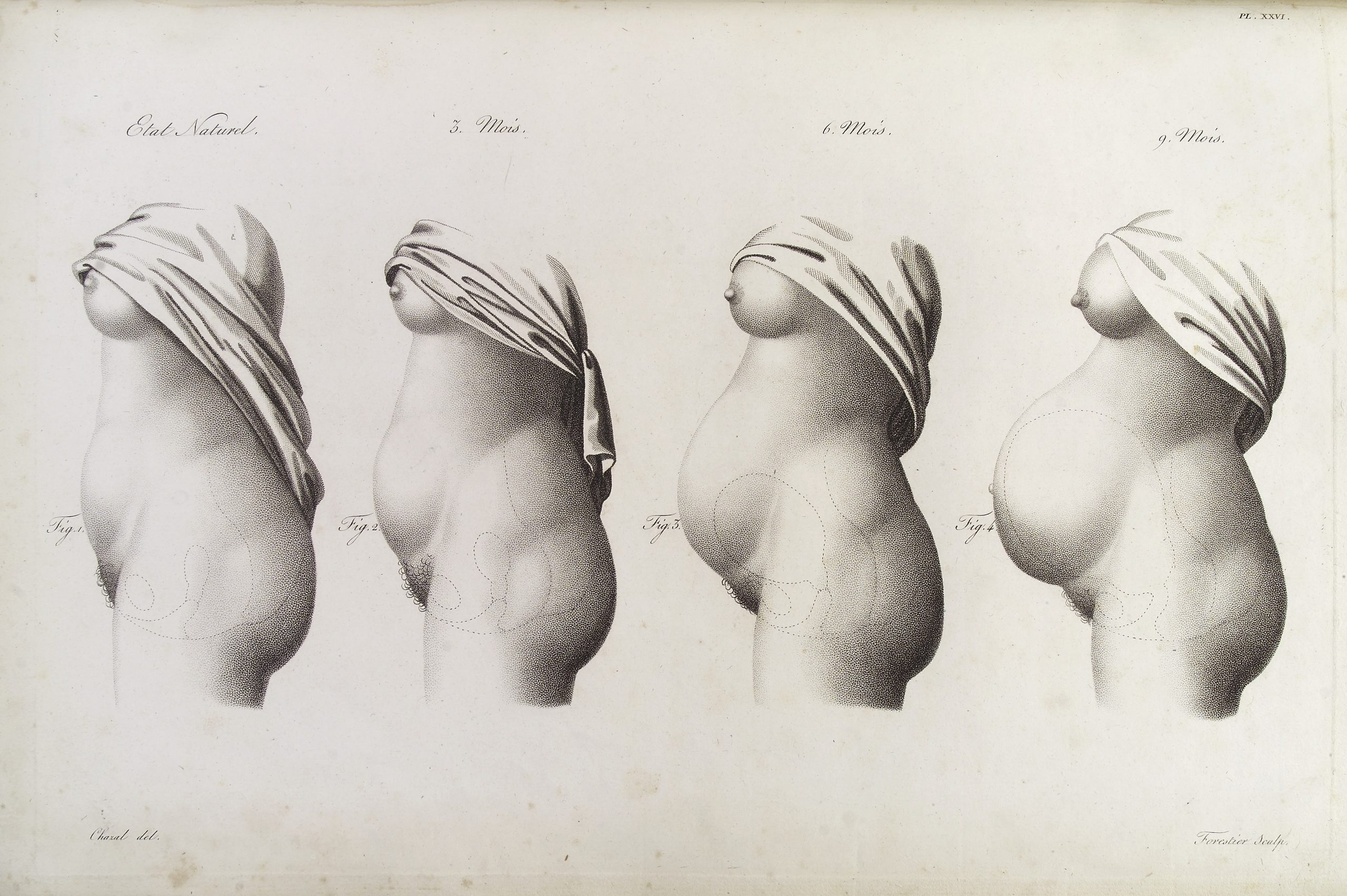When you find out for the first time that you are pregnant, it is one of the best feelings in the world. You realize that you are a part of something bigger rather than just yourself. You have a whole new life inside you just waiting to be born and come into this bittersweet world. Here, we are going to read and understand the multiple pregnancy stages of a woman’s life and how to go about them all. Pregnancy technically begins on the first day of your last menstrual period. This is ‘menstrual age’ which is two weeks ahead of the time when conception actually occurs.
Table of Contents
Conception
Eggs, called oocytes, release from the ovary for ovulation every month. These eggs then develop in small cysts filled with fluid, known as follicles. One of the follicles acts as a dominant and suppresses the other follicles. This follicle then goes through the complete maturation process. The follicle then opens and releases the egg.
The ovulation process begins about two weeks before the start of your next menstrual cycle. Once the ovulation completes, the ruptured follicle converts into a corpus luteum. The corpus luteum secretes progesterone and estrogen. The progesterone helps to implant the embryo by preparing the link of the uterus called endometrium.
Fertilization, as mentioned earlier, occurs two weeks after your last period cycle. Changes can beset around the egg, once the sperm penetrates it, to prevent the entry of other sperm. The genetic build-up, including gender, of the baby, is complete during fertilization.
Pregnancy Stages
The pregnancy stages are split into three trimesters. The first of the pregnancy stages is the first trimester. This is through the first and the twelfth week of your pregnancy. During the pregnancy stages first trimester, the body is projected to many changes. You may have strong feelings of nausea and fatigue. With changes taking place in the body, you will have to make changes in your daily routine. You need to sleep longer and better, sleep early, eat frequently even if it is in a small amount and have small meals. Most of the feeling of discomfort will gradually slip away with the process of your pregnancy. Some women may not feel the slightest discomfort during this period but others may suffer a lot. It varies from one woman to another.
The second trimester is during the time period of the 13th week and the 28th week of pregnancy. The second trimester is usually much easier than the first. You may realize that the feeling of nausea and fatigue is hardly there anymore. As your baby continues to grow, your abdomen will begin to expand. This trimester will get over in the blink of an eye. You will be able to feel your baby move inside your body.
During the third trimester, you would not be able to leave home much. The doctors recommend complete rest at this time. Some of the discomforts you felt during the second trimester might still be there. You might find difficulty in breathing, and require to use the loo more often. As your baby keeps growing, it puts pressure on your organs. There is nothing to worry about. These problems will reduce once you give birth.
Pregnancy Stages and Symptoms
With every stage of pregnancy, the symptoms change. During the first trimester, you may see symptoms of extreme tiredness, tender and swollen breasts, upset stomach – morning sickness, cravings or dictate for certain food items, uncontrollable mood swings, constipation, having to use the loo often, headache, heartburn, and weight gain or loss. These are all a part of the pregnancy and there is nothing to give yourself trouble about.
During the second trimester of the pregnancy stages, the body changes in order to create space for your baby. You may feel body aches like back, groin, and abdomen pain. You might find stretch marks on the abdomen, thighs and breasts. You might find a line running across your skin near your belly button. You might come across patches of dark skin in some parts of your body like over the cheeks, nose, upper lips, and forehead. These are the signs of ‘mask of pregnancy’
During this period, you might also feel tingling hands known as the carpal tunnel syndrome. You may have an itchy feeling on your palms, abdomen, and feet soles. You can also face swelling of ankles, face, and fingers. In case you feel nauseous, loss of appetite, vomiting, jaundice, extreme fatigue or notice sudden and extreme swelling, gain weight suddenly then consult your doctor.
In the third trimester of your pregnancy, you may feel breathlessness, heartburn, swollen ankles, face and fingers. You may also see symptoms of hemorrhoids, soft breasts, trouble in sleeping. You might feel your baby moving in the abdomen. You might feel contractions that can be signs of labor or could be a false alarm.
Pregnancy Stages Fetal Development
A hormone called Human chorionic gonadotrophin (hCG) is present in your bloodstream from conception. After fertilization, the fertilized egg known as the zygote produces the hCG hormone. This hormone helps in the detection of pregnancy during pregnancy test.
It takes about a month from the first day of your last period for the amount of hCG to increase in order for the test to detect it. This is during the first month of the gestational age. The estimation of the sex of the fetus can be made during the 3rd week.
Fetal Development During First Trimester
During the first trimester, the size of the embryo is similar to that of a pinhead in the beginning. The embryo grows into the size of a pea. The eyes, nose, and arms start shaping up. The heart of the embryo beats at about 110 beats per minute and can be heard during an ultrasound. Later, its hands, feet, mouth, and face start forming.
Next, the formation of the trachea and bronchi in the lungs takes place. The pseudo glandular stage of lung development starts. The embryo continues to grow bigger. Its fingers and toes start to develop. The intestine elongates and moves out of the abdomen, into the base of the umbilical cord. The intestine returns into the abdomen of the fetus in about 12 weeks.
The tail of the embryo starts to disappear. The formation of fingerprints takes place and the bone cells replace the cartilages. The fetus begins to breathe. It starts making random movements. It begins to concentrate iodine in its thyroid and produces thyroid hormone. The pancreas starts making insulin while the kidney starts producing urine. All the major organs develop completely by 3 months of gestation period. Even though the formation has already taken place, the organs are weak and immature for the fetus to be able to survive without the womb.
Fetal Development During Second Trimester
At the start of the second trimester, the toenails of the fetus start to form. The sensation of the movement of the fetus, called quickening, may occur in some cases. The fetus develops ears and a sense of hearing. The canalicular period of lung development begins during this period. The pseudo glandular stage of lung development comes to an end by now. Since the alveoli are still developing, respiration cannot be possible. Soon, the ears of the fetus start responding to sound. You can now recognise the ears, nose, and lips.
In the 20th week of the gestation period, the fetus is full of hair, known as lanugo. It starts developing scalp hair and is able to produce antibodies. By now, the fetus is capable of sucking and grasping. It might have bouts of hiccups every now and then. Some women may feel contractions during this time.
By the 22nd week, the survival rate of the fetus outside of the womb is 9%. Soon, the fetus begins to have rapid eye movements during sleep. With weeks passing by, the rate of survival of the fetus outside the womb begins to increase. The terminal saccular stage of lung development comes to an end.
The fetus can begin to breathe by now. It is now, able to open and close its eyelids. Towards the end of the second trimester, the fetus begins to respond to the sound that occurs in the mother’s surroundings. The rate of survival also increases by up to 50%.
Fetal Development During Third Trimester
At the beginning of the third trimester, the fetus has eyelashes, it has red-colored skin covered in vernix caseosa, a wax-like matter which acts as a protective film and has anti-infective and waterproof properties. The survival rate shoots up to 94% at the beginning itself. The fetus grows at a rapid speed. During the 32nd and the 33rd week, the fetus starts forming muscles and stores body fat. If the fetus is a boy then by this time, his testicles start descending. By the 36th week of gestation, the fetus is in the late preterm stage.
It is in early-term stage by the 37th and the 38th week. The fetus in full-term stage by the 41st week of the gestation period. The physical development of your baby is complete. It is trying to put on fat that it needs in order to regulate its body temperature in the outside world.
Overdue Pregnancy
Any pregnancy that continues for longer than a period of 42 weeks is post-term, overdue or prolonged. It is normal for your baby to arrive past its due date yet, your doctor needs to monitor it thoroughly. Due dates are not always accurate. Many studies show that 55% of women give birth within a week either side of the predicted due date.
70% of women give birth within 10 days of the same. There is no reason as such as to why some babies are overdue. If you are older, heavier, expecting your first baby or having a boy then you might have an overdue baby. If your mother or sister had an overdue baby then you are more likely to have an overdue baby.
If your baby is overdue then, the doctors will first inform and offer you a membrane sweep. Membrane sweep makes it more likely that you will fo into natural labor. It reduces the chance you will need to go into labor by other means like oxytocin or prostaglandins.
If it is your first pregnancy then the doctor will offer you a membrane sweep in your 40th and 41st week. If you have had a baby before, the doctor might offer you to do a memorial sweep at your 41st-week appointment. You can reject the offer if you do not see it fit. You can consult health professionals and choose what you see fit for your baby.
Premature Birth
If your baby is born more than three weeks before the estimated due date then it is known as premature birth. It occurs before the 37th week of your pregnancy. Premature babies have many complicated medical issues, especially the ones that are born too early. The earlier your baby is born, the higher are the rate of its complications. Most premature births take place during the late preterm stage which is during the 34th and the 36th week of pregnancy.
Your baby may show subtle or obvious signs and symptoms of complications. The symptoms may include – small body with a disproportionately large head, sharper looking, less rounded features as compared to a full-term baby which occurs due to lack of fat stored, hair covering the body, low body temperature, respiratory distress, and lack of reflexes for sucking and swallowing.
You with the help of the doctors, need to take special care of the baby. They are much more fragile and delicate as compared to full-term babies. They are kept in the special nursery unit at the hospital for a longer period.
If required, they may be kept in an intermediate care nursery or the neonatal intensive care unit (NICU). A specialized team of trained doctors and nurses will take care of your baby and help you with the same. Your baby will need extra help in terms of feeding and adapting after delivery. Do ask them any queries you have regarding your baby. The health team can help you understand what is necessary and how they plan to take care of your newly born so that he can get healthy and be ready to step into the world.
Writing allows me to pour my heart out in words. So, that’s what I’ve been doing for the past 6 years. I strive to bring in a change in the world by taking tiny steps of curating the right message that needs to be conveyed.





